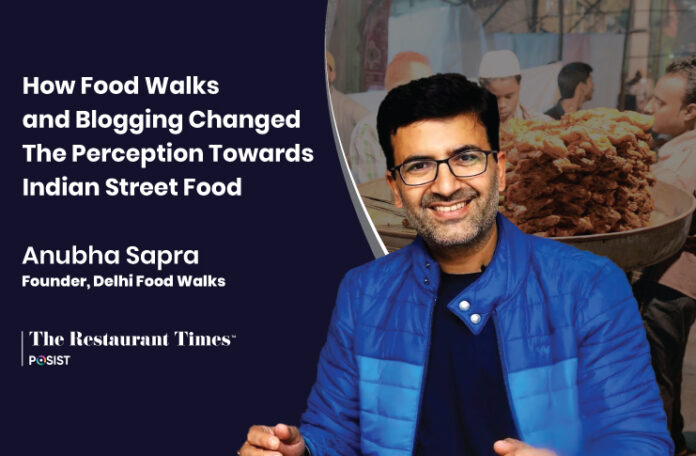When it comes to eating out, we often rely on recommendations shared by friends and family. So it happens that sometimes even the locals don’t know much about the best places to eat, and end up missing out on many good places.
However, the internet changed it for all of us. The search has answers to everything you want to know about. Along with this change, there has been a cultural evolution in the importance of food. People these days are more open to the idea of traveling to a foreign country simply because they want to explore and experience the unique cuisine and listen to unheard stories.
In Conversation with Anubhav Sapra, Founder of Delhi Food Walks.
In this episode of F&B Talks, we’re in conversation with Anubhav Sapra, a long-time Delhi resident and storyteller. He curates Delhi Food Walks to introduce travelers and locals alike to the city’s authentic cuisine and culture.
TRT: How did you come up with the idea of having a food walk? What kind of challenges have you faced? And, how were you able to overcome them?
Anubhav Sapra: I started Delhi Food Walks a decade ago in 2011. It’s been almost 12 years since then. When I started there were no food walks in Delhi. There were heritage walks, architecture walks, and art walks but there wasn’t any professionally organized food walk.
I started out as a blogger writing about the best and lesser-known places to eat at, stories of the people, and street food vendors. It was quite popular among the food community. The idea of having a food walk germinated from there. I thought I have been writing about this so why not have a group of like-minded people who would love to go and explore different neighborhoods in Delhi.
That said, I hadn’t planned on making a career out of it at that time. I was working with a non-profit organization at that time. After my office hours, I would go to old Delhi and spend time walking around the streets, exploring the street food, talking to vendors, and writing blogs about my experiences over the weekend.
Interestingly, when I started conducting research for these walks I realized that Delhi has a sizable migrant population. People from various parts of the country moved in here and brought their local cuisines to the neighborhoods they live in as well. And those cuisines were yet to be explored by the locals.
For the initial 3-4 years, I focused on curating these experiences and introducing people to different cultures and their food. Till that time, these were community walks that anyone could join for free. It is only in 2014 when I finally decided to quit the job that I decided to make it a sustainable source of income for myself and started the concept of customized food walks.
Talking about challenges, the foremost challenge was dealing with the mindset that street food is unsafe. The second challenge was that for foreigners Indian food is really spicy; I had to tell them about the difference between spicy and hot food. There were many other challenges related to hygiene and cleanliness. However, I have been able to overcome all these challenges slowly and steadily.
The majority of the people who come for these walks are foreigners and there have been no upsetting incidents as such. We ensure to only visit places that serve food safe enough for our foreign audience as well. It’s been more than 7-8 years that we have been doing this regularly now and I see a big change in the perception of Indian street food internationally.
These days people travel to India just to explore the street food. So, I think we have been quite instrumental in changing the earlier perception of Indian food.
TRT: How was your experience with COVID-19? Do you see any changes between the pre and post-pandemic era? What are the challenges that you are still facing?
Anubhav Sapra: During the COVID era there was no influx of travelers. The tourism and hospitality industry was the most affected during the pandemic. I tried to do virtual food tours but I was not satisfied with that, for example, you can tell stories through videos but you can’t make anyone taste the food.
The street vendors were hit badly by the pandemic. We started a campaign to help them out during this phase.
That said, the pandemic is not completely over yet as we are still seeing a surge in the cases. Though people have started coming to tours again, it is not the same as it was the pre-COVID era. Earlier, we used to do 4-5 walks every day. Now there would be only one walk per week. So, the frequency has come down.
I am looking forward to the winters, especially the period between October-March as it’s the peak tourist season in Delhi.
TRT: In this era of content overload, there are some people who are still unaware of the concept of food blogging. Could you help us understand your take on food blogging and what factors one needs to keep in mind before starting it as a career and even as a hobby?
Anubhav Sapra: Nowadays, it’s really easy to start a food blog and if you keep doing it over a period of time you will have viewership or readership and then you can monetize your content. If you are writing a blog, you can earn revenue from Google ads. The only important factor is consistency. You should do it only if you are convinced about and really passionate about food.
TRT: What is your take on the short-form video content that is very popular these days?
Anubhav Sapra: See if you talk about the masses, the majority prefers reels and short-form visual content. But I think for me personally, it doesn’t make any sense as there is only as much you can explain in such a short format.
Over a period of time, the attention span of viewers has come down drastically. There was a time when we used to watch long-form content. Now, all the blogging platforms and all the social media platforms are trying to put short-form content.
I have been on both sides but I prefer long-form content as it tends to be evergreen content.
For example, if I am making a video I keep in mind that after 5 years also the content should be relevant and if you make something of 15 seconds it’s lost after a week or after 24 hours, or after 2 or 3 days. The shorter form of content might get viral and you may get views out of it but after a certain period of time, it will lose its credibility and value.
TRT: How do you research places to review? What are the factors that you consider before reviewing?
Anubhav Sapra: Whenever I travel, I try to contact the local people from different cities to show me around their culture and food because you get a lot of insights from a person who has grown up and lived there. Secondly, these days it’s very easy to create a listicle about the best places to eat at any place. On the Internet, there are thousands of listicles that will pop up on a similar theme. The only thing is to stick to one blog and identify if it’s written by a credible writer or blogger or anyone who has good knowledge about the place whether online or through a local person.
TRT: What is your vision going ahead? Also, any advice to all the budding bloggers and influencers that you want to give on a personal note?
My vision is that we have already explored the food of 25 states in India. A few states are still left because of the pandemic we couldn’t do all of them so we are planning for it over the next few months to cover. A few places in the Northeast and South of the country are left.
Once we have covered all the parts of India, we will explore other countries as well. As for my advice to any budding food bloggers, I would suggest they do it only if they are passionate about it and not just for the sake of views or followers. Also, one must keep doing it consistently and should not leave it in between.

















